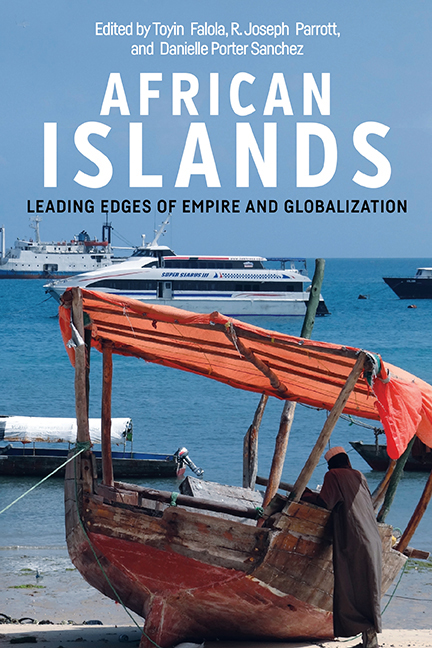Book contents
- Frontmatter
- Dedication
- Contents
- Introduction: Arbiters and Witnesses of Change: Contextualizing Conversations on African Islands
- Part 1 Atlantic Ocean Islands
- Part 2 Indian Ocean Islands
- 8 Africa's Indian Ocean Islands, Near and Distant
- 9 Monsoon Metropolis: Migration, Mobility, and Mediation in the Western Indian Ocean
- 10 The Mascarenes, Indian Ocean Africa, and Global Labor Migration during the Eighteenth and Nineteenth Centuries
- 11 The Island as Nexus: Zanzibar in the Nineteenth Century
- 12 Slavery and Postslavery in Madagascar: An Overview
- 13 The Comoros: Strategies of Islandness in the Indian Ocean
- 14 Gendered Pioneers from Mayotte: An Ethnographic Perspective on Travel and Transformation in the Western Indian Ocean
- Notes on Contributors
- Index
10 - The Mascarenes, Indian Ocean Africa, and Global Labor Migration during the Eighteenth and Nineteenth Centuries
from Part 2 - Indian Ocean Islands
Published online by Cambridge University Press: 31 August 2019
- Frontmatter
- Dedication
- Contents
- Introduction: Arbiters and Witnesses of Change: Contextualizing Conversations on African Islands
- Part 1 Atlantic Ocean Islands
- Part 2 Indian Ocean Islands
- 8 Africa's Indian Ocean Islands, Near and Distant
- 9 Monsoon Metropolis: Migration, Mobility, and Mediation in the Western Indian Ocean
- 10 The Mascarenes, Indian Ocean Africa, and Global Labor Migration during the Eighteenth and Nineteenth Centuries
- 11 The Island as Nexus: Zanzibar in the Nineteenth Century
- 12 Slavery and Postslavery in Madagascar: An Overview
- 13 The Comoros: Strategies of Islandness in the Indian Ocean
- 14 Gendered Pioneers from Mayotte: An Ethnographic Perspective on Travel and Transformation in the Western Indian Ocean
- Notes on Contributors
- Index
Summary
The Mascarene Islands of Mauritius and Réunion have long languished on the periphery of African studies. Surveys of African history pay little or no attention to the islands or the Mauritian dependencies of Rodrigues and, until they became a separate British Crown colony in 1903, the Seychelles. This indifference stems partly from the islands’ geographical isolation hundreds of miles east of the African mainland and Madagascar. The islands’ shallow historiographical footprint also reflects the fact that Mauritius and Réunion were not occupied permanently by humans until 1638 and 1663, respectively, while Rodrigues remained uninhabited until 1756 and the Seychelles were not colonized until 1770. The continuing reluctance of many Africanists to look beyond the beaches at Mogadishu, Mombasa, and Mozambique as they reconstruct eastern and southern Africa's history has likewise helped to ensure that the islands continue to be ignored. So has the fact that coming to terms with Mascarene history entails exploring complex patterns of social, economic, cultural, and political interaction between Indians, Southeast Asians, and Chinese as well as Africans, Malagasies, and Europeans. The failure of Mauritian, Réunionnais, and Seychellois historians to situate local developments in regional, global, or comparative contexts further reinforces the perception that the islands played little or no role in African history during the eighteenth and nineteenth centuries.
Similar attitudes plague studies of labor migration in the European colonial world. The pervasive Atlantic-centrism in modern slavery studies continues to hobble our understanding of European slave trading and often obscures the fact that millions of enslaved Africans reached parts of the world other than the Americas between the sixteenth and midnineteenth centuries. Studies of transoceanic slave trading in the Indian Ocean are, in turn, afflicted by a high degree of Africa-centrism and a tendency to focus on the northwestern Indian Ocean to the exclusion of other parts of this oceanic world. This practice of privileging certain geographic regions over others is matched by a propensity to draw a sharp dividing line between the pre- and postemancipation eras in the colonial world and an attendant proclivity to view the free and forced migrant labor trades that flourished before and after the abolition of slavery in the British Empire in 1834 as separate and distinct phenomena unto themselves. Studies of the slaves, convicts, and indentured laborers who reached the Mascarenes between the late seventeenth and early twentieth centuries attest as much.
- Type
- Chapter
- Information
- African IslandsLeading Edges of Empire and Globalization, pp. 294 - 316Publisher: Boydell & BrewerPrint publication year: 2019

